Lawn Bowling
Often called summertime curling, lawn bowling has an ancient history.
There are sports you just know are going to have an interesting story. And lawn bowling is one of them. Whereas I assumed the game had originated in England, I learned that archeologists in Egypt have uncovered “biased” – unevenly weighted – bowls thought to be 7,000 years old. Small wonder the game’s origins, according to one website, are “hidden in the haze of antiquity.”
Historians believe the game of bowls wended its way from Egypt to Greece and Rome and then to Europe and Britain. Known as a nation of curlers, Scotland is considered the home of modern lawn bowling, which might be expected, as the game is commonly referred to as summertime curling. It is surprising, though, that Canada isn’t also a lawn-bowling powerhouse, given that we have many talented men – and women – with brooms. Whereas this country has about 270 lawn-bowling clubs nationwide (some 90 of them in Ontario), there are more than 200 public bowling greens in Glasgow alone.
Playing outdoors on a flat surface called a “green,” which is divided into long, narrow “rinks,” competitors try to get as many bowls (the weighted balls of various sizes) as close as possible to the “jack” (a smaller white ball). In this way the game is a lot like curling.
Before trying my hand at the game brought to Canada by the British in the 1700s, I watched a regular Friday morning league match at the Monora Lawn Bowling Club, located in Monora Park just outside Orangeville. I’d expected the experience to remind me of the hushed silence and white attire associated with tennis at Wimbledon. Instead, the 17 players who showed up on a sunny morning last September wore casual, comfortable clothing, and laughed and joked as they divided themselves into teams and began “delivering” their bowls on Monora’s artificial turf. “Oh, we don’t get real sticky about the rules,” explained club treasurer Lynne Sparks, who had arranged for me to give the game a try.
Originally made of stone, bowls are now formed of hard plastic. A set includes four bowls of equal size and weight, and players can choose a set that suits them best. The smallest bowls, for example, are often easier to handle for women and many of the seniors who make up most of the players at Monora – and elsewhere.
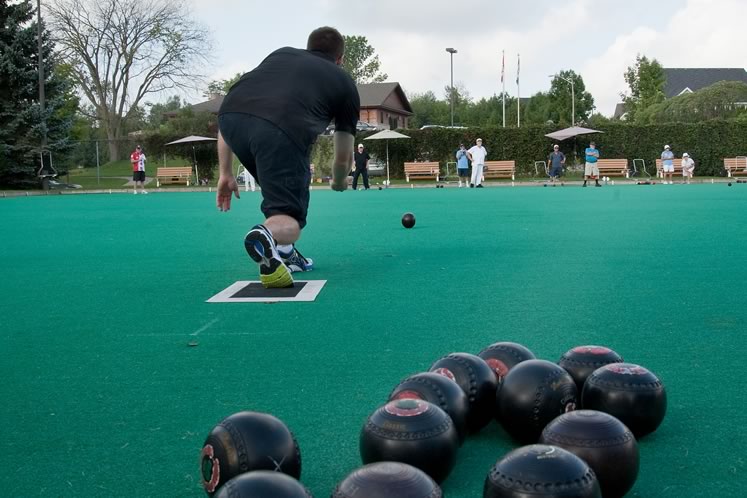
Chandler Eves delivers a bowl with impressive form at the Monora Lawn Bowling Club. Photo by Rosemary Hasner / Black Dog Creative Arts. *In the print version of the spring issue, Chandler Eves was incorrectly identified in a different photo. We regret the error.
The bowls themselves are beautiful things. Appearing to be made of wood rather than plastic, each set has a unique design and feel. Players supply – and not surprisingly become attached to – their own sets.
The bias of the bowls is one of a number of features that make lawn bowling different from not only curling, but also the Italian bocce and the French boules or pétanque. On each side of a bowl is a coloured circle, one larger than the other. When a bowl is delivered, it curls toward the smaller circle. How much it curls depends on the bowl’s size and weight, how hard it’s delivered, and the nature of the green. An advantage of heavier bowls is that they make it easier to knock competing bowls away from the jack. Bowls are delivered in a manner similar to the way a bowling ball is released – somewhere between the toss of boules or bocce and the low release of curling.
When it was my turn to give the game a try, I realized the league players I’d been watching had made it look easy. Phyllis Robertson told me she’d been playing for 34 years. Clad in a T-shirt, pedal pushers and sandals, she was as agile as most 20-year-olds. “It keeps you active,” she told me after the game. Her partner Dorothy Naylor, a 50-year club member, made the provincial finals in Ottawa in 1976. “We won more matches than we lost,” she said.
Like Dorothy, Canada’s international lawn bowling teams have won more matches than they’ve lost, but Canadian teams have never taken gold at a world championship or the Commonwealth Games. That may be about to change. At the 2018 Commonwealth Games, Team Canada posted its best showing yet, grabbing silver in the men’s singles event and, with fourth-place finishes, coming agonizingly close to medals in men’s threes and all the women’s events (singles, pairs, threes and fours).
Back in Monora Park, I was demonstrating my very non-gold-medal technique. Lynne’s husband, Brian, the club president, acted as skip, standing in the place where he wanted me to aim my bowl so it would roll toward the jack. Sometimes I’d get the direction right but deliver my bowl with too much “enthusiasm,” so that it rolled past the jack into the “ditch” and out of play. Other times I’d release the bowl and Lynne would coach me: “Oh, you’re too light,” as the bowl stopped short of the jack, or “You didn’t follow through.” Fortunately, I improved quickly as I became familiar with the way the bowls are weighted.
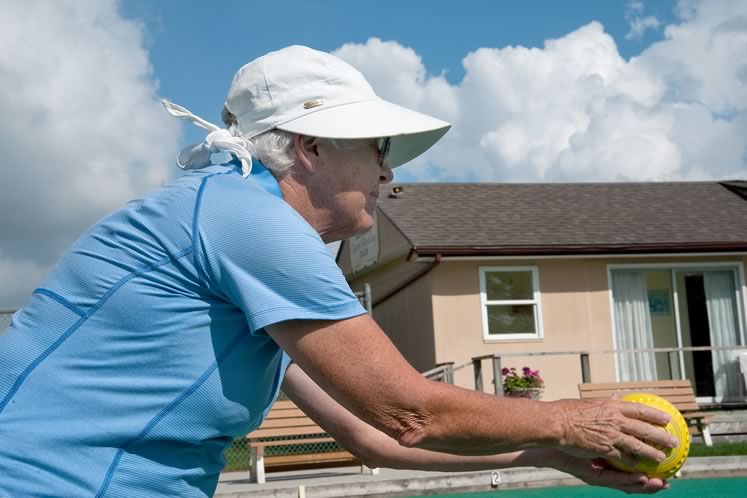
Carol Finlayson, a visitor to Monora from Midland’s lawn bowling club, lines up her shot. Photo by Rosemary Hasner / Black Dog Creative Arts.
Similarly, Chandler Eves, who at 35 is one of the club’s youngest bowlers, said he picked up the game fairly quickly. Chandler is out on the green two evenings a week during the summer bowling season. He competed in his inaugural tournament the first year he played. That was an experience for him because, unlike in league play, competitors take the rules seriously. Chandler recommends the sport to anyone. “It’s less expensive and takes less time than golf – and it’s more fun,” he said.
The fun factor may account for why lawn bowling was banned in both France and England in the early 1300s. When the citizenry of both countries began to abandon archery for bowling, their monarchs shut the game down because they needed skilled archers to protect their domains.
Fun is Lynne’s main reason for playing. It’s wonderful exercise, she said, and social as well. “And you don’t have to be a great athlete to have a good time.”
For more about lawn bowling
Logic suggests there might be a green in the tiny Amaranth hamlet of Bowling Green, but no, there is no bowling green in Bowling Green (apparently named after a “pretty place” in the United States). The Monora Lawn Bowling Club is the sole green in Headwaters, though there are clubs in nearby Brampton, Dundalk and Arthur. For locations visit Ontario Lawn Bowls Association.
At Monora, two daytime and a pair of nighttime leagues provide opportunities to play singles or on a team of two or three. Men and women often make up mixed teams, but they also compete separately. After a match, members tend to congregate in the clubhouse for snacks and a visit.
The club hosts its annual open house on Saturday, May 11, from 1 p.m. to 4 p.m. Everyone is welcome to come out and give the game a try. You can use the club’s bowls and enjoy refreshments.
For more information, call Brian Sparks, 519-943-1076.
Related Stories
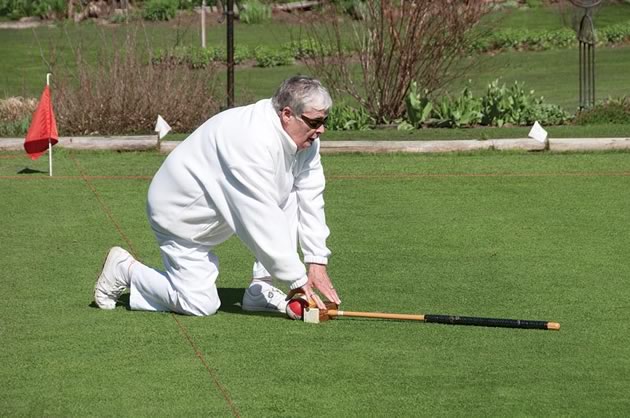
A Courtly Romance
Jun 16, 2011 | | Good SportCroquet, at least the version I was about to learn, is both remarkably like and completely different from what most kids play.
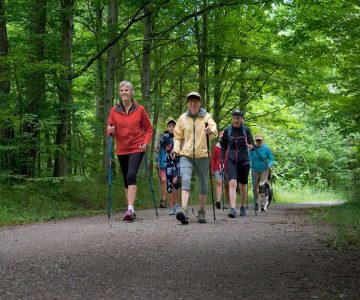
Nordic Pole Walking
Sep 18, 2018 | | Good SportWalking with poles: the fashionable walking stick morphs into essential hiking gear.
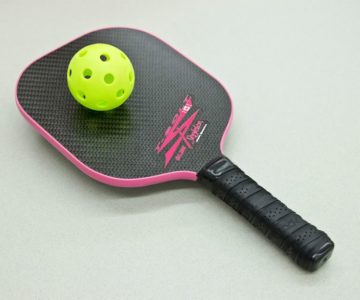
Pickleball, Anyone?
Sep 16, 2017 | | Good SportThe name may be goofy, but this racquet sport delivers a competitive workout.
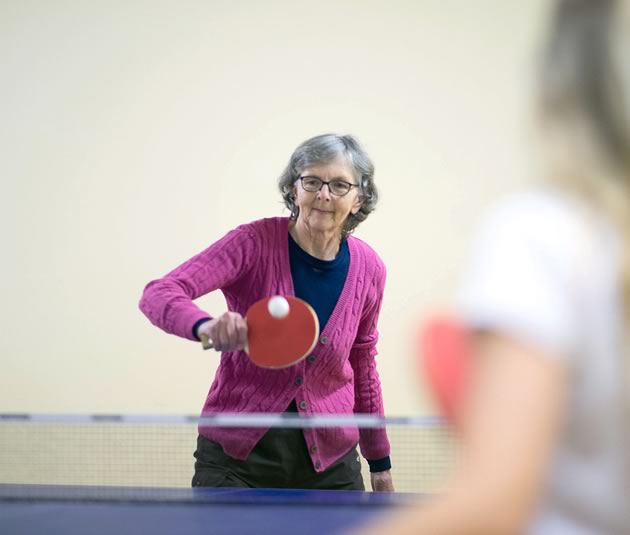
Playing Ping-Pong in Mono is a Community Affair
Mar 20, 2017 | | Good SportA dedicated band of Ping-Pong fans of every age congregate every week to show their paddle power.
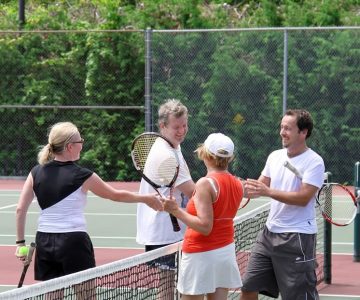
Tennis a Lifelong Sport
Mar 23, 2015 | | Good SportWith nine community clubs and one busy private club, you can find a game anytime, anywhere in Headwaters.









